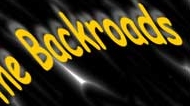EDDIE & FRANK THOMAS
ANGELS ON THE BACKROADS
VOLUME 1 - MEMPHIS TO CLACK'S STORE
(Misty Owl Music)
A few weeks ago as I was driving to work,
I heard a spellbinding NPR segment on two brothers from Iuka,
Mississippi who embarked on odyssey beginning in Memphis,
Tennessee down through the Mississippi Delta to New Orleans.
Eddie Thomas (a multi-instrumentalist).and his brother Frank
set out on a journey that traced the legacy of the blues
heritage along Highway 61 and beyond. Once they would arrive at
one of the historic locations, Eddie would play a song by the
musician specifically associated with that particular site
while Frank would document the performance and photograph the
event.
These "field" recordings
successfully place the listener on the scene, experiencing the
story of the blues from a unique vantage point. In
contrast to poet John Sinclair's similar evocation Fattening
Frog For Snakes: The Delta Sound which takes the listener on a
figurative journey, Angels on the Backroads literally takes us
there. This novel approach pans out nicely. The feel of this
recording varies markedly from place to place, song to song. At
such places as the majestic Orpheum Theatre in Memphis and the
ballroom of the Peabody Hotel, Eddie's plaintive guitar playing
and heartfelt vocals ring pure and clear, placing the listener
in front row seats for a grand concert. Elsewhere, we are
treated to rooftop performances and outdoor performances in
bustling city squares with trolleys passing by. Then there's a
performance of Robert Wilken's "That's No Way to Get
Along" recorded at Memphis' Central Railroad Station where
Wilkens once worked as a Pullman Porter. Then there's Tommy
Johnson's "Big Road Blues" recorded beneath a
magnolia tree in Desoto Park on the bank of the
Mississippi River. Soon enough, the Thomas Brothers begin
their journey and head out to Highway 61 where they record a
couple of tunes out on the open road.
(I'd be remiss if I didn't mention the
three flawed studio recordings included here. These tunes, a
Memphis Slim number, an Ike Turner tune and Louis Jordan's
"Let the Good Times Roll" a) utilize the dreaded
synthesizer (!) b) show Eddie's limitations as a swinger/rocker
and c) were recorded back home in the studio in Iuka,
Mississippi, making their inclusion dubious. However,
this small misstep is easily forgiven, considering the overall
quality and integrity of this well conceived labor of love.)
Whether you are a passionate blues
aficionado, a neophyte or just searching for something unique,
historically significant and totally sincere, I heartily
recommend Eddie and Frank Thomas' Angels on the Backroads - one
of the most fascinating recordings of recent vintage.
-Michael Dominici
EDDIE & FRANK THOMAS
ANGELS ON THE BACKROADS
VOLUME 2 - ROBINSONVILLE TO THE VALLEY
STORE
(Misty Owl Music)
Angels on the Backroads Volume 2
continues the blues odyssey of the Iuka, Mississippi brothers
Eddie and Frank Thomas as they revisit historic locations in
the Mississippi Delta along Highway 61. Multi-instrumentalist
Eddie Thomas sticks mostly to the acoustic guitar this time out
(although there’s some nice work on the harmonica and
piano here as well.) Once again, the greatest rewards come from
the stories, the sounds of the highway, the rustling atmosphere
and the reconnection with the haunted land of the blues. Eddie
Thomas stimulates the imagination effectively, and considering
the challenge of taking on the legacies of so many diverse
styles and distinctive musicians that emanated from this
region, acquits himself well by literally placing the listener
on location in The Mississippi Delta.
This chapter begins with a visit to the
fabled “cross roads” immortalized in Robert
Johnson’s “Cross Roads Blues.” Soon enough,
we’re down the road listening to Gus Cannon’s
(a.k.a. “Banjo Joe”) instrumental “Hollywood
Rag” as the wind rustles through the 10 foot tall grass,
sounding like sweet summer rain. One of the best things about
this series is the eclectic song selection, like Willie
Brown’s provocative “M&O Blues” and Rubin
Lacey’s “Ham Hound Crave” (with the line
“Let me be your sometimes ‘til your always
comes…” ). It’s interesting that the Sheriff
came by during their recording “Poor Boy, Long Ways from
Home” since the law has always had a peculiar
relationship with the blues in these parts. The caper here is
the thrilling ride on Bukka White’s “Special
Streamline.” This conversational classic features Bukka
White talking out a hip Q&A routine, where he answers
rhetorical questions with his guitar, whispering, “Now
make it lonesome, ‘cause I’m a hobo myself
sometimes…” Angels on the Backroads Volume 2 closes
out with fine versions of Charlie Patton’s “Pea
Vine Blues” and Mississippi John Hurt’s
“Avalon Blues.” Can’t wait to hear where
Eddie & Frank Thomas take us to on Volume 3.
– Michael Dominici
ORDER
TOLL FREE
1-866-451-6047






